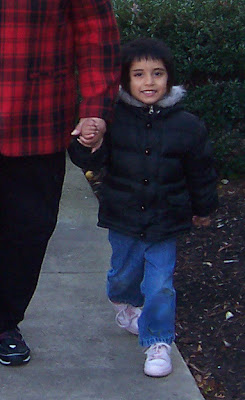Transitioning to kindergarten: hearing from children who have been there
By Peggy Ashbrook
Posted on 2009-08-01
 Some elementary schools on a “year-round” or “modified calendar” are about to begin a new school year on Monday, and many others begin in September. Children from my “fours” classes are among the new kindergarten students and I feel so protective of them even though I believe they are ready for the the work, the larger school building, and sometimes a larger class size. After his first week in elementary school my son told us, “They have so many rules there.” New rules in the new school with a larger class size and a larger student body—he soon acclimated to that school’s culture but it was a process.
Some elementary schools on a “year-round” or “modified calendar” are about to begin a new school year on Monday, and many others begin in September. Children from my “fours” classes are among the new kindergarten students and I feel so protective of them even though I believe they are ready for the the work, the larger school building, and sometimes a larger class size. After his first week in elementary school my son told us, “They have so many rules there.” New rules in the new school with a larger class size and a larger student body—he soon acclimated to that school’s culture but it was a process.
Learning and teaching are easier when children feel comfortable. Read what children say as they tell what new children need to know about starting school in the International Journal of Transitions in Childhood website links to full text papers from the European Early Childhood Education Research Association (EECERA) Annual Conferences.
I remember my first day as a parent at a preschool, wondering how all the other parents seemingly knew what to do—where to put the cubby bag and tuition check, and where to find extra paints, the mop, and the key to restock the paper towels. There was institutional knowledge that was unwritten. Once we become part of a community we may no longer see the need for posting such information. As teachers we can take the lead to increase the comfort level of new students and new families by sharing the unwritten “rules” and culture of our classrooms.
Here are my suggestions for families participating in science activities at one co-op preschool:
- Participate in the activities as an explorer. This will encourage your child to do so.
- Make observations after giving the children a chance to do so (but adults do not have to share all the knowledge they have).
- Ask open-ended questions that can have multiple answers, such as, “What do you see happening?”
- Don’t answer most questions—that’s the children’s job! Instead say, “I wonder how we can find out?” It’s ok to leave questions unanswered, especially when the details are more complex than they are ready to understand (a fine line!).
Do you have special practices to welcome new students and families to your school? Tell me about them by clicking on the word “Comments” below.
Peggy
Disclaimer: The views expressed in this blog post are those of the author(s) and do not necessarily reflect the official position of the National Science Teaching Association (NSTA).

